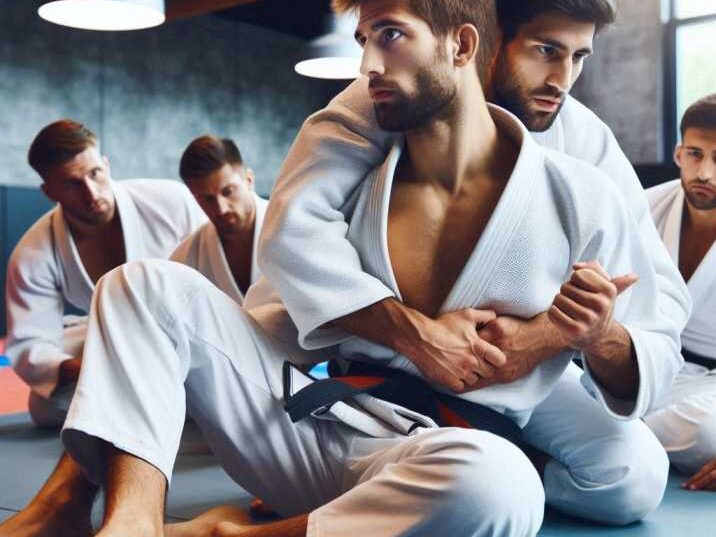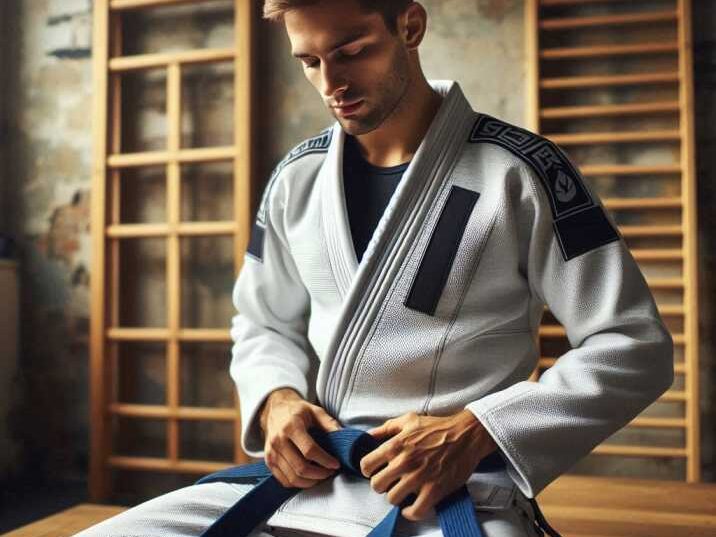Introduction:
Table of Contents
Brazilian Jiu-Jitsu (BJJ) is a martial art that focuses on ground fighting, submission holds, and grappling. It’s a fun and effective way to stay fit, build strength, and learn self-defence techniques. Whether you’re interested in it for fitness, discipline, or as a competitive sport, BJJ has a lot to offer. If you’re wondering how to start Brazilian Jiu-Jitsu, this article will guide you through everything you need to know.
In this article, we’ll cover the basics of Brazilian Jiu-Jitsu, the steps to start training, the benefits of BJJ, and answers to frequently asked questions. Whether you’re looking to improve your fitness, and self-confidence, or just enjoy a new hobby, starting BJJ can be a life-changing experience!

What is Brazilian Jiu-Jitsu (BJJ)?
Brazilian Jiu-Jitsu is a martial art that focuses on using leverage, technique, and positioning to control and submit an opponent, even if the opponent is larger or stronger. Unlike other martial arts that rely on striking, BJJ emphasizes grappling, ground control, and submissions such as arm locks, chokes, and joint locks.
Developed in Brazil by the Gracie family in the early 20th century, BJJ has become one of the most popular martial arts worldwide, especially in the field of mixed martial arts (MMA). It teaches practitioners how to defend themselves and defeat opponents by using skill rather than strength alone.
Why Start Brazilian Jiu-Jitsu?
There are many reasons why people choose to start Brazilian Jiu-Jitsu. Here are just a few:
- Physical Fitness: BJJ is an excellent way to improve overall fitness. It builds strength, endurance, flexibility, and cardiovascular health.
- Self-Defense: The techniques taught in BJJ are designed to help you defend yourself in real-life situations, especially if you’re taken to the ground.
- Discipline and Focus: Training in Brazilian Jiu-Jitsu requires concentration and dedication, which helps improve focus not only on the mats but also in other areas of life, such as school or work.
- Confidence: As you progress through the belts in BJJ, you’ll gain confidence in your abilities. It’s a great way to challenge yourself and achieve personal goals.
- Stress Relief: Like other forms of physical exercise, BJJ is an effective way to relieve stress and clear your mind.
How to Start Brazilian Jiu-Jitsu: A Step-by-Step Guide
Starting BJJ can seem intimidating, but with the right guidance, it can be an exciting and rewarding journey. Follow these steps to get started:
1. Find a Brazilian Jiu-Jitsu School or Academy
The first step in starting BJJ is to find a good school or academy near you. Look for a gym with experienced instructors, a welcoming environment, and students of all levels. Many academies offer a free trial class, so you can experience BJJ firsthand before committing.
- Research Local Academies: Search for Brazilian Jiu-Jitsu schools in your area. You can check Google, and social media, or ask for recommendations from friends or family.
- Check Reviews: Look at reviews on Google, Yelp, and Facebook to see what other students think of the school.
- Visit the School: Visit the academy to get a feel for the atmosphere. Look at the gym’s cleanliness, the instructors’ experience, and the students’ friendliness.
2. Get the Right Gear for BJJ
You’ll need some basic gear when you start training in Brazilian Jiu-Jitsu. Unlike other sports, BJJ requires specific uniforms and equipment to ensure safety and comfort.
- Gi: A Gi (also called a kimono) is a traditional uniform worn by BJJ practitioners. It’s made of durable fabric and allows you to practice grips and submissions. When starting, you’ll need a white or blue Gi.

- No-Gi Gear: Some academies also offer No-Gi classes, where you wear athletic instead of a Gi. Common No-Gi gear includes rash guards and shorts.
- BJJ Belt: As you progress through the ranks in Brazilian Jiu-Jitsu, you’ll earn different coloured belts. Starting practitioners wear a white belt, and the belt colour changes as you progress.
- Mouthguard: Protect your teeth and mouth by using a mouthguard during sparring sessions.
- Shin Guards and Knee Pads: These can be useful for protecting your legs during training.
3. Start with the Basics
Brazilian Jiu-Jitsu can seem overwhelming when you first start but remember: everyone was a beginner at some point. Don’t worry if you don’t understand everything right away. Focus on learning the basics and building a strong foundation.
- Positions: Learn the basic positions, such as mount, guard, side control, and back control.
- Submissions: Begin practising simple submissions like the armbar and rear-naked choke.
- Escapes and Sweeps: Learn how to escape from bad positions and use sweeps to reverse the position.
4. Focus on Consistency
Like any new skill, consistency is key to improving in BJJ. Attend classes regularly, practice at home if possible, and stay committed to your training. Progress in Brazilian Jiu-Jitsu takes time, so be patient with yourself.
- Train at Least 2-3 Times a Week: To make steady progress, aim to train at least 2-3 times per week.
- Ask Questions: Don’t be afraid to ask your instructor for help if you don’t understand something. BJJ instructors are there to guide you.
- Be Open to Learning: Be humble and open-minded in your approach to learning. Don’t compare yourself to others—focus on your journey.
5. Join the BJJ Community
One of the best things about Brazilian Jiu-Jitsu is the sense of community. BJJ academies are full of people who are passionate about learning and improving together. Joining the BJJ community will motivate you to keep training and will help you make new friends.
- Spar and Roll: Sparring (also called rolling) is an essential part of BJJ training. It allows you to test your skills against live resistance and improves your understanding of techniques.
- Attend Events: If you’re interested, you can participate in BJJ competitions, which can be a fun way to challenge yourself and measure your progress.
Benefits of Brazilian Jiu-Jitsu
1. Improved Physical Fitness
BJJ is a full-body workout that improves strength, flexibility, cardiovascular endurance, and coordination. The constant movement, grappling, and rolling help you build muscle and burn fat while having fun.
2. Mental Focus and Discipline
Brazilian Jiu-Jitsu requires concentration, patience, and discipline. As you learn new techniques, you’ll improve your ability to focus and problem-solve. This mental clarity will help you not just on the mat, but in other aspects of your life, like school and work.
3. Self-Defense Skills
BJJ is designed for self-defence, especially in situations where you are on the ground. By learning submissions and escapes, you can defend yourself in real-life situations, regardless of your size or strength.
4. Boost in Confidence
As you advance in Brazilian Jiu-Jitsu, you’ll gain confidence in your abilities. The process of learning and earning belts helps you develop a strong sense of accomplishment, and overcoming challenges in training will make you more resilient in everyday life.
Conclusion:
Starting Brazilian Jiu-Jitsu is an exciting and rewarding experience. By finding the right academy, getting the proper gear, and focusing on the basics, you’ll be well on your way to becoming proficient in this martial art. Whether you’re training for fitness, self-defence, or competition, BJJ offers numerous benefits that can improve your physical health, mental focus, and overall well-being.
So, take the first step today! Sign up for a class, put on your Gi, and begin your Brazilian Jiu-Jitsu journey. Remember, progress takes time, but with dedication and consistency, you’ll achieve your goals!
FAQs About Starting Brazilian Jiu-Jitsu
1. Do I need to be fit to start BJJ?
No, you don’t need to be fit to start Brazilian Jiu-Jitsu. BJJ will help you get fit over time as you train and build strength and endurance.
2. What is the best age to start Brazilian Jiu-Jitsu?
People of all ages can start BJJ! While children can start as young as 4 or 5, adults can begin training at any age.
3. How long does it take to get a blue belt in BJJ?
On average, it takes about 2-3 years of consistent training to earn a blue belt in BJJ, though the timeline can vary.
4. Is Brazilian Jiu-Jitsu good for self-defence?
Yes, BJJ is very effective for self-defence, especially in situations where you find yourself on the ground.
5. Do I need to compete in BJJ?
No, you don’t have to compete in Brazilian Jiu-Jitsu. Many people train just for fitness, self-defence, or fun.


